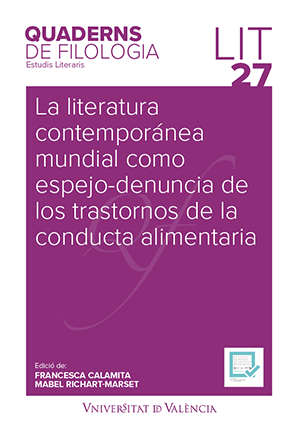Starvation, Binging and Disorderly Eating in Global Women’s Writing
DOI:
https://doi.org/10.7203/qdfed.27.25729Keywords:
Gender, literary studies Abstract
Abstract
Women’s relationship with food has been (mis)interpreted
since the very beginning of Western history, often erroneously equating
eating with shame, sin, and transgression. Therefore, writing about women’s
relationship with food and in particular on eating disorders and disorderly
eating in fiction, autobiographies and accounts is not simply about describing
the symptoms of these pathologies and the daily routine of the protagonists;
it also means writing about complex issues of identity and on the self, the female
body, social norms and behaviours and reflecting on women’s anxieties
towards their gender roles. As captured by this special issue of Quaderns de
filologia, the portrayal of eating disorders and disorderly eating in women’s
writing from around the world engages with these complex issues, and the
way women have discussed their anxieties towards identities and social roles
through their relationship with body and food.
 Downloads
Downloads
Downloads
Published
How to Cite
-
Abstract412
-
PDF (Español)581
Issue
Section
License
 Este obra está bajo una licencia de Creative Commons Reconocimiento-NoComercial-SinObraDerivada 4.0 Internacional.
Este obra está bajo una licencia de Creative Commons Reconocimiento-NoComercial-SinObraDerivada 4.0 Internacional.
Authors who publish with this journal agree to the following terms:
- Authors retain copyright and grant the journal right of first publication with the work simultaneously licensed under a Creative Commons Attribution License that allows others to share the work with an acknowledgement of the work's authorship and initial publication in this journal.
- Authors are able to enter into separate, additional contractual arrangements for the non-exclusive distribution of the journal's published version of the work (e.g., post it to an institutional repository or publish it in a book), with an acknowledgement of its initial publication in this journal.
- Authors are permitted and encouraged to post their work online (e.g., in institutional repositories or on their website) prior to and during the submission process, as it can lead to productive exchanges, as well as earlier and greater citation of published work (See The Effect of Open Access).




